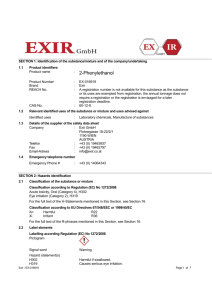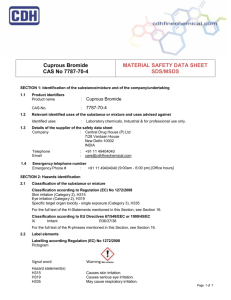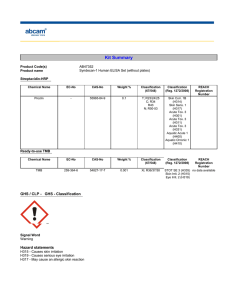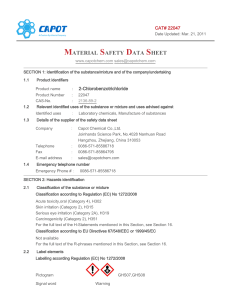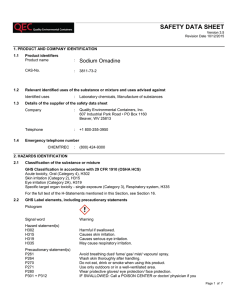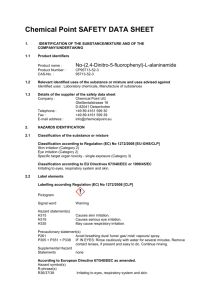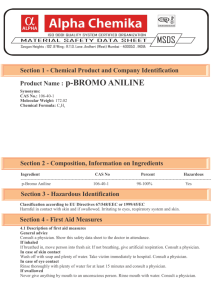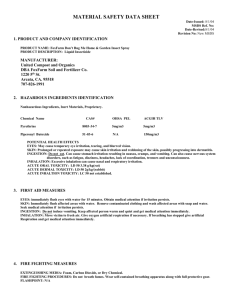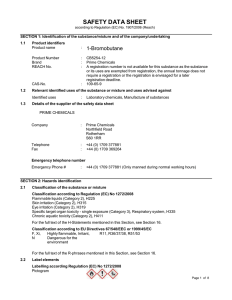Säntis Analytical AG
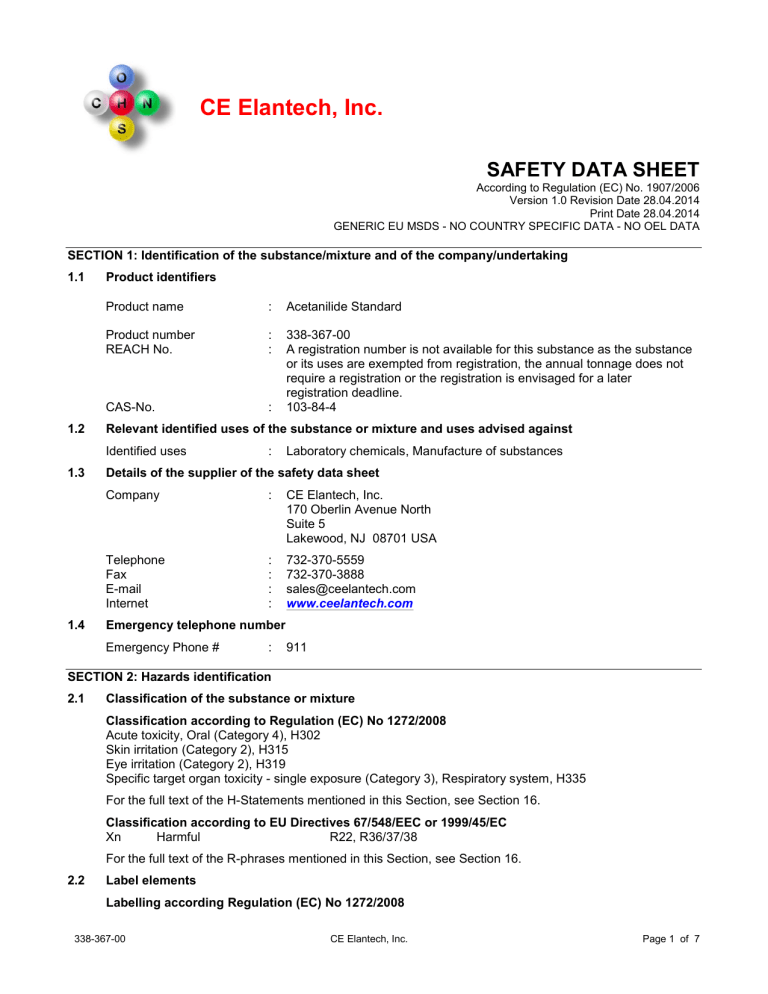
CE Elantech, Inc.
SAFETY DATA SHEET
According to Regulation (EC) No. 1907/2006
Version 1.0 Revision Date 28.04.2014
Print Date 28.04.2014
GENERIC EU MSDS - NO COUNTRY SPECIFIC DATA - NO OEL DATA
SECTION 1: Identification of the substance/mixture and of the company/undertaking
1.1 Product identifiers
Product name
Product number
REACH No.
CAS-No.
: Acetanilide Standard
: 338-367-00
: A registration number is not available for this substance as the substance or its uses are exempted from registration, the annual tonnage does not require a registration or the registration is envisaged for a later registration deadline.
: 103-84-4
1.2 Relevant identified uses of the substance or mixture and uses advised against
Identified uses : Laboratory chemicals, Manufacture of substances
1.3 Details of the supplier of the safety data sheet
Company
Telephone
Fax
Internet
: CE Elantech, Inc.
170 Oberlin Avenue North
Suite 5
Lakewood, NJ 08701 USA
: 732-370-5559
: 732-370-3888
: sales@ceelantech.com
: www.ceelantech.com
1.4 Emergency telephone number
Emergency Phone # : 911
SECTION 2: Hazards identification
2.1 Classification of the substance or mixture
Classification according to Regulation (EC) No 1272/2008
Acute toxicity, Oral (Category 4), H302
Skin irritation (Category 2), H315
Eye irritation (Category 2), H319
Specific target organ toxicity - single exposure (Category 3), Respiratory system, H335
For the full text of the H-Statements mentioned in this Section, see Section 16.
Classification according to EU Directives 67/548/EEC or 1999/45/EC
Xn Harmful R22, R36/37/38
For the full text of the R-phrases mentioned in this Section, see Section 16.
2.2 Label elements
Labelling according Regulation (EC) No 1272/2008
338-367-00 CE Elantech, Inc.
Page 1 of 7
Pictogram
Signal word
Hazard statement(s)
H302
H315
H319
H335
Precautionary statement(s)
P261
P305 + P351 + P338
Warning
Harmful if swallowed.
Causes skin irritation.
Causes serious eye irritation.
May cause respiratory irritation.
Avoid breathing dust.
IF IN EYES: Rinse cautiously with water for several minutes. Remove contact lenses, if present and easy to do. Continue rinsing.
none Supplemental Hazard
Statements
2.3 Other hazards none
SECTION 3: Composition/information on ingredients
3.1 Substances
Synonyms
Formula
Molecular Weight
: N-Phenylacetamide
: C8H9NO
: 135,17 g/mol
CAS-No.
EC-No.
: 103-84-4
: 203-150-7
Hazardous ingredients according to Regulation (EC) No 1272/2008
Component Classification Concentration
Acetanilide
CAS-No.
EC-No.
103-84-4
203-150-7
Acute Tox. 4; Skin Irrit. 2; Eye
Irrit. 2; STOT SE 3; H302,
H315, H319, H335
Hazardous ingredients according to Directive 1999/45/EC
Component Classification
<= 100 %
Concentration
Acetanilide
CAS-No.
EC-No.
103-84-4
203-150-7
Xn, R22 - R36/37/38 <= 100 %
For the full text of the H-Statements and R-Phrases mentioned in this Section, see Section 16
SECTION 4: First aid measures
4.1 Description of first aid measures
General advice
Consult a physician. Show this safety data sheet to the doctor in attendance.
If inhaled
If breathed in, move person into fresh air. If not breathing, give artificial respiration. Consult a physician.
In case of skin contact
Wash off with soap and plenty of water. Consult a physician.
In case of eye contact
Rinse thoroughly with plenty of water for at least 15 minutes and consult a physician.
If swallowed
338-367-00 CE Elantech, Inc.
Page 2 of 7
Never give anything by mouth to an unconscious person. Rinse mouth with water. Consult a physician.
4.2
Most important symptoms and effects, both acute and delayed
The most important known symptoms and effects are described in the labelling (see section 2.2) and/or in section 11
4.3 Indication of any immediate medical attention and special treatment needed no data available
SECTION 5: Firefighting measures
5.1 Extinguishing media
Suitable extinguishing media
Use water spray, alcohol-resistant foam, dry chemical or carbon dioxide.
5.2 arising from the substance or mixture
Carbon oxides, nitrogen oxides (NOx)
Special hazards
5.3 Advice for firefighters
Wear self-contained breathing apparatus for firefighting if necessary.
5.4 Further information no data available
SECTION 6: Accidental release measures
6.1 Personal precautions, protective equipment and emergency procedures
Use personal protective equipment. Avoid dust formation. Avoid breathing vapors, mist or gas. Ensure adequate ventilation. Evacuate personnel to safe areas. Avoid breathing dust.
For personal protection see section 8.
6.2 Environmental precautions
Prevent further leakage or spillage if safe to do so. Do not let product enter drains. Discharge into the environment must be avoided.
6.3 Methods and materials for containment and cleaning up
Pick up and arrange disposal without creating dust. Sweep up and shovel. Keep in suitable, closed containers for disposal.
6.4 Reference to other sections
For disposal see section 13.
SECTION 7: Handling and storage
7.1 Precautions for safe handling
Avoid contact with skin and eyes. Avoid formation of dust and aerosols.Provide appropriate exhaust ventilation at places where dust is formed.For precautions see section 2.2.
7.2 Conditions for safe storage, including any incompatibilities
Store in cool place. Keep container tightly closed in a dry and well-ventilated place. 7.3 Specific end use(s)
Apart from the uses mentioned in section 1.2 no other specific uses are stipulated
SECTION 8: Exposure controls/personal protection
8.1 Control parameters
Components with workplace control parameters
8.2 Exposure controls
Appropriate engineering controls
Handle in accordance with good industrial hygiene and safety practice. Wash hands before breaks and at the end of workday.
Personal protective equipment
Eye/face protection
Safety glasses with side-shields conforming to EN166 Use equipment for eye protection tested and approved under appropriate government standards such as NIOSH (US) or EN 166(EU).
338-367-00 CE Elantech, Inc.
Page 3 of 7
Skin protection
Handle with gloves. Gloves must be inspected prior to use. Use proper glove removal technique
(without touching glove's outer surface) to avoid skin contact with this product. Dispose of contaminated gloves after use in accordance with applicable laws and good laboratory practices.
Wash and dry hands.
The selected protective gloves have to satisfy the specifications of EU Directive 89/686/EEC and the standard EN 374 derived from it.
Body Protection
Complete suit protecting against chemicals, The type of protective equipment must be selected according to the concentration and amount of the dangerous substance at the specific workplace.
Respiratory protection
For nuisance exposures use type P95 (US) or type P1 (EU EN 143) particle respirator. For higher level protection use type OV/AG/P99 (US) or type ABEK-P2 (EU EN 143) respirator cartridges.
Use respirators and components tested and approved under appropriate government standards such as NIOSH (US) or CEN (EU).
Control of environmental exposure
Prevent further leakage or spillage if safe to do so. Do not let product enter drains. Discharge into the environment must be avoided.
SECTION 9: Physical and chemical properties
9.1 Information on basic physical and chemical properties a) Appearance b) Odor
Form: solid no data available c) Odor Threshold d) pH e) Melting point/freezing point f) Initial boiling point and boiling range g) Flash point j) Upper/lower flammability or explosive limits k) Vapor pressure no data available no data available
1 hPa at 114 °C
Melting point/range: 113 - 115 °C
304 °C at 1.013 hPa
161 °C - closed cup h) Evaporation rate no data available i) Flammability (solid, gas) no data available no data available l) Vapor density m) Relative density n) Water solubility o) Partition coefficient: noctanol/water p) Auto-ignition temperature q) Decomposition temperature r) Viscosity no data available no data available no data available no data available no data available no data available no data available
338-367-00 CE Elantech, Inc.
Page 4 of 7
s) Explosive properties t) Oxidizing properties no data available no data available
9.2 Other safety information no data available
SECTION 10: Stability and reactivity
10.1 Reactivity no data available
10.2
Chemical stability
Stable under recommended storage conditions.
10.3 Possibility of hazardous reactions no data available
10.4 Conditions to avoid no data available
10.5 Incompatible materials
Strong oxidizing agents, Strong bases 10.6 Hazardous decomposition products
In the event of fire: see section 5
SECTION 11: Toxicological information
11.1
Information on toxicological effects
Acute toxicity
LD50 Oral - rat - 800 mg/kg
Inhalation: no data available
Skin corrosion/irritation no data available
Serious eye damage/eye irritation no data available
Respiratory or skin sensitization no data available
Germ cell mutagenicity
Mouse Micronucleus test
Carcinogenicity
IARC: No component of this product present at levels greater than or equal to 0.1% is identified as probable, possible or confirmed human carcinogen by IARC.
Reproductive toxicity no data available
Specific target organ toxicity - single exposure
Inhalation - May cause respiratory irritation.
Specific target organ toxicity - repeated exposure no data available
Aspiration hazard no data available Additional Information
RTECS: AD7350000
May cause cyanosis., To the best of our knowledge, the chemical, physical, and toxicological properties have not been thoroughly investigated.
SECTION 12: Ecological information
12.1
Toxicity
Toxicity to fish LC50 - Lepomis macrochirus - 100 mg/l - 96 h
338-367-00 CE Elantech, Inc.
Page 5 of 7
12.2
Persistence and degradability no data available
12.3
Bio accumulative potential no data available
12.4 Mobility in soil no data available
12.5
Results of PBT and vPvB assessment
PBT/vPvB assessment not available as chemical safety assessment not required/not conducted
12.6
Other adverse effects
Harmful to aquatic life. no data available
SECTION 13: Disposal considerations
13.1 Waste treatment methods
Product
Offer surplus and non-recyclable solutions to a licensed disposal company. Dissolve or mix the material with a combustible solvent and burn in a chemical incinerator equipped with an afterburner and scrubber.
Contaminated packaging
Dispose of as unused product.
SECTION 14: Transport information
14.1 UN number
ADR/RID:
14.2 UN proper shipping name
ADR/RID: Not dangerous goods
IMDG:
IATA:
Not dangerous goods
Not dangerous goods
IMDG:
14.3 Transport hazard class(es)
ADR/RID:
14.4 Packaging group
ADR/RID:
14.5 Environmental hazards
ADR/RID: no
IMDG:
IMDG:
IMDG Marine pollutant: no
IATA:
IATA:
IATA:
IATA: no
14.6 Special precautions for user no data available
SECTION 15: Regulatory information
This safety datasheet complies with the requirements of Regulation (EC) No. 1907/2006.
15.1
Safety, health and environmental regulations/legislation specific for the substance or mixture no data available
15.2
Chemical Safety Assessment
For this product a chemical safety assessment was not carried out
SECTION 16: Other information
Full text of H-Statements referred to under sections 2 and 3.
Acute Tox.
Eye Irrit.
H302
H315
H319
338-367-00
Acute toxicity
Eye irritation
Harmful if swallowed.
Causes skin irritation.
Causes serious eye irritation.
CE Elantech, Inc.
Page 6 of 7
H335
Skin Irrit.
May cause respiratory irritation.
Skin irritation
Full text of R-phrases referred to under sections 2 and 3
Xn
R22
R36/37/38
Harmful
Harmful if swallowed.
Irritating to eyes, respiratory system and skin.
Further information
The above information is believed to be correct but does not purport to be all inclusive and shall be used only as a guide. The information in this document is based on the present state of our knowledge and is applicable to the product with regard to appropriate safety precautions. It does not represent any guarantee of the properties of the product. Säntis Analytical AG shall not be held liable for any damage resulting from handling or from contact with the above product. This document is protected by copyright.
All duplication for commercial purposes requires approval by Säntis Analytical AG.
Data provided in collaboration with Säntis Analytical AG Teufen Switzerland
338-367-00 CE Elantech, Inc.
Page 7 of 7
